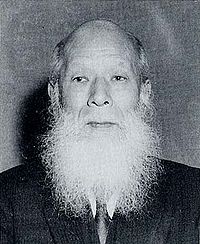
Back هيديتسوجو ياجى ARZ هیدتسوقو یاقی AZB Yagi Hidetsugu German Χιντετσούγκου Γιάγκι Greek Hidetsugu Yagi Spanish هیدتسوگو یاگی Persian Hidetsugu Yagi Finnish Hidetsugu Yagi French Hidetsugu Yagi Italian 八木秀次 Japanese
Hidetsugu Yagi | |
|---|---|
| 八木 秀次 | |
 | |
| Born | January 28, 1886 |
| Died | January 19, 1976 (aged 89) |
| Nationality | Japanese |
| Occupation | Engineering scientist |
| Known for | Yagi–Uda antenna |
| Awards | Blue Ribbon Award (1951), the Order of Culture (1956) and the Order of the Rising Sun, First Class (1976) |
| Scientific career | |
| Fields | Electrical engineering |
Hidetsugu Yagi (八木 秀次, Yagi Hidetsugu, January 28, 1886 – January 19, 1976) was a Japanese electrical engineer from Osaka, Japan. When working at Tohoku Imperial University, he wrote several articles that introduced a new antenna designed by his assistant Shintaro Uda to the English-speaking world.
The Yagi-Uda antenna, patented in 1926, allows directional transmission using radio waves, and is especially useful in the very high frequency and ultra high frequency radio bands . Antennas of this type were widely used for television and radio reception, and are still common in communication and radar systems. [citation needed] Yagi also tried, unsuccessfully, to introduce a wireless power transmission system.[citation needed] He participated in establishing the Chiba Institute of Technology.[1][citation needed]
He was the fourth president of Osaka University from February 1946 to December 1946.[2]
In 1942, he became the President of Tokyo Institute of Technology, in 1944 he became the President of the Technical Institution, and in 1946 also the President of the Osaka Imperial University. He was decorated with the Medal of Honor with Blue Ribbon Award in 1951, with the Order of Culture in 1956, and posthumously with the Grand Cordon of the Order of the Rising Sun in 1976.[citation needed]
- ^ Chiba Institute of Technology history Archived 2014-03-09 at the Wayback Machine
- ^ Osaka University history